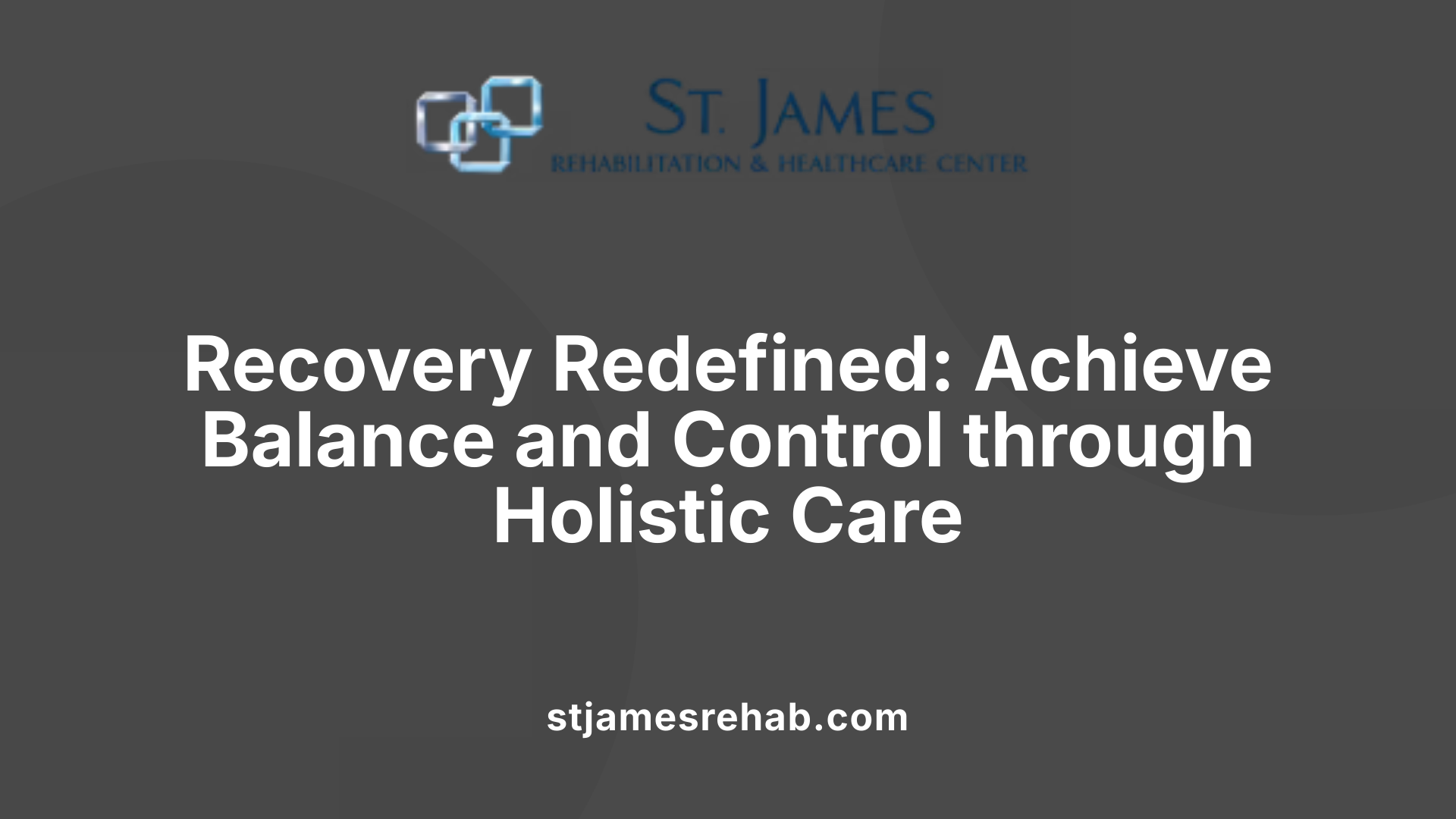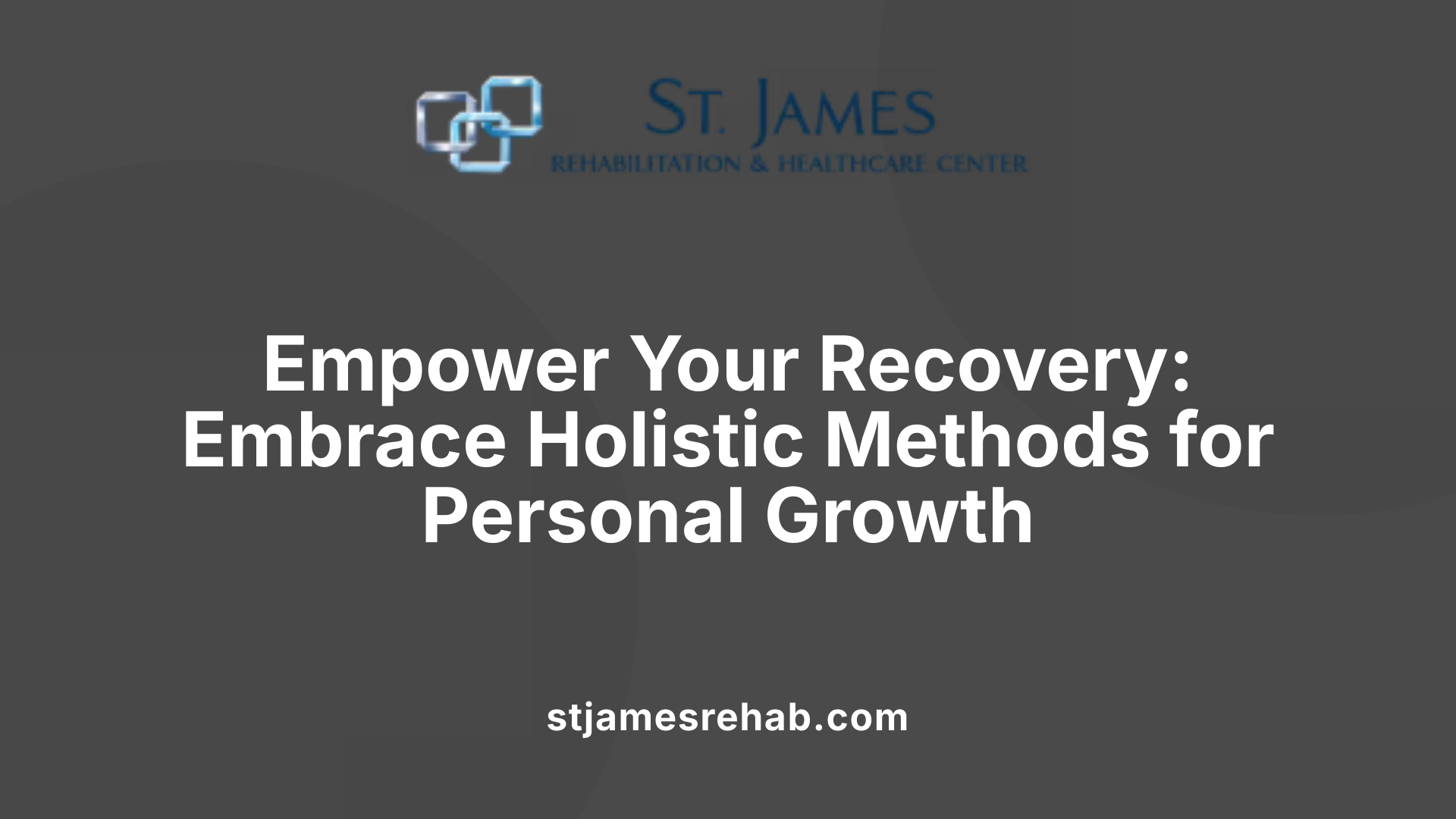Why Holistic Rehabilitation Helps You Regain a Sense of Control
The Path to Empowerment and Whole-Person Healing

Understanding the Power of Holistic Care in Recovery
Holistic rehabilitation is transforming the landscape of addiction treatment and mental health recovery by addressing individuals in their entirety—mind, body, and spirit. This comprehensive approach recognizes that lasting change stems from healing the root causes of issues, fostering self-awareness, and promoting personal empowerment. In this article, we explore how holistic principles help individuals regain control of their recovery journey, emphasizing the interconnectedness of overall wellness and growth.
The Benefits of Holistic Rehabilitation in Recovery and Regaining a Sense of Control

What are the benefits of holistic rehabilitation in recovery and regaining a sense of control?
Holistic rehabilitation offers a comprehensive approach to recovery by addressing the interconnected physical, emotional, mental, and spiritual aspects of an individual's health. Instead of merely targeting symptoms, it seeks to uncover and treat the root causes of addiction, such as trauma, emotional distress, or spiritual disconnection. By doing so, it helps prevent relapse and supports more sustainable, long-term recovery.
Incorporating a variety of therapies like mindfulness meditation, yoga, acupuncture, and nutritional counseling can significantly improve overall well-being. These practices help reduce cravings, manage withdrawal symptoms, and foster a sense of inner balance. Mindfulness and meditation, in particular, promote emotional resilience by teaching clients to better understand and regulate their feelings.
Holistic programs also focus on relearning essential life skills such as problem-solving, time management, conflict resolution, and financial literacy. Strengthening these skills enhances self-confidence and independence, empowering individuals to navigate daily life more effectively.
Furthermore, holistic care prioritizes healing relationships with family and friends through therapy and support groups. Strengthening social support networks is vital for emotional stability and ongoing sobriety.
Overall, holistic approaches foster self-awareness, resilience, and healthier lifestyles. They encourage self-compassion and personal growth, enabling individuals to take charge of their recovery journey with renewed purpose and control. This integrated, person-centered care is essential for lasting sobriety and holistic well-being.
Contributing to Personal Empowerment through Holistic Methods

How do holistic approaches contribute to personal empowerment during recovery?
Holistic methods significantly enhance personal empowerment by treating the whole person—mind, body, emotions, and spirit—rather than just focusing on addiction symptoms. When individuals actively participate in their healing process, they gain a deeper understanding of themselves and their unique needs.
Practices such as mindfulness meditation, yoga, acupuncture, nutritional adjustments, and expressive therapies like art and music therapy foster self-awareness. This increased awareness enables individuals to recognize their triggers, emotional states, and underlying issues that contribute to substance use.
Holistic recovery encourages active engagement with these practices, empowering individuals to develop new coping strategies and healthier lifestyle habits. This proactive approach helps build confidence and independence, essential for maintaining sobriety in the long term.
Addressing multiple facets of well-being supports emotional resilience and reduces stress, anxiety, and emotional pain. Techniques like deep breathing, guided imagery, and self-care routines help regulate emotions, promote inner peace, and strengthen mental health.
Integrating traditional therapies—such as counseling and medication—with complementary practices creates a comprehensive, personalized treatment plan. This allows individuals to feel more in control of their healing journey, promoting a sense of purpose and personal mastery.
By nurturing the mind-body-spirit connection, holistic approaches foster personal growth, self-compassion, and motivation essential for lasting change. As individuals see tangible progress and regain control over their health and lives, their self-esteem and belief in their ability to sustain sobriety grow.
Overall, holistic methods turn recovery into an empowering process, helping individuals develop resilience, self-reliance, and a positive outlook, equipping them to face future challenges with strength and confidence.
More information for exploration:
- Search query: "Holistic healing in addiction, personal empowerment, self-awareness in recovery"
Core Principles and Philosophy of Holistic Recovery Methods

What are the principles and philosophy of holistic recovery methods?
Holistic recovery methods are built on the understanding that a person’s health and well-being are interconnected across multiple dimensions—namely the mind, body, spirit, and emotions. This approach recognizes that each component influences the others, and overall healing occurs best when all facets are addressed collectively.
At the heart of holistic philosophy is the belief that everyone has innate healing abilities. Instead of solely focusing on symptom relief, holistic care seeks to identify and treat the underlying causes of issues, such as trauma, emotional distress, or spiritual disconnection. This means employing strategies that promote natural healing processes, aiming for long-term health rather than temporary fixes.
Personalized care and proactive prevention are crucial elements. Treatment plans are tailored to the individual’s unique needs, circumstances, and life experiences. Such plans may incorporate traditional medical interventions alongside complementary therapies like mindfulness meditation, yoga, nutritional guidance, emotional counseling, and spiritual practices.
A significant aspect of this philosophy is promoting patient empowerment. Individuals are encouraged to actively participate in their healing journey, developing self-awareness, self-compassion, and resilience. This empowerment fosters a sense of ownership over their recovery, leading to sustained healthier lifestyles.
Integration of conventional medicine with alternative therapies is a defining feature. While evidence-based practices such as behavioral therapy, medication-assisted treatment, and medical detox are foundational, they are complemented by holistic modalities—art therapy, music therapy, acupuncture, massage, and wilderness therapy—that together create a comprehensive treatment framework.
The ultimate goal is to create harmony within the individual by restoring balance across all health facets. This leads to overall well-being, personal development, and long-lasting recovery. The holistic approach emphasizes that true healing involves nurturing the body, mind, and spirit in unison, fostering a life of greater purpose, clarity, and resilience.
Techniques and Methods Supporting Holistic Recovery

What techniques and methods are used in holistic rehabilitation to support recovery?
Holistic rehabilitation employs a broad spectrum of practices designed to address the multifaceted needs of individuals recovering from addiction. These techniques aim to treat the whole person—mind, body, emotions, and spirit—by fostering a sense of balance and harmony.
Common methods include mindfulness, meditation, yoga, acupuncture, art and music therapy, massage therapy, and nutritional counseling. Each of these approaches contributes to physical, mental, emotional, and spiritual healing. For example, mindfulness and meditation practices enhance self-awareness, reduce stress, and improve emotional regulation. Yoga combines physical postures, controlled breathing, and meditation to promote flexibility, relaxation, and mental clarity.
Acupuncture and massage are used to manage physical symptoms, reduce cravings, and ease withdrawal discomfort. Nutritional counseling ensures patients replenish vital nutrients lost during substance use, supporting brain health and emotional stability.
These complementary therapies are frequently integrated with traditional treatments such as cognitive-behavioral therapy (CBT), group therapy, and trauma-focused counseling. This blend promotes a comprehensive, personalized approach to healing.
Holistic techniques also emphasize developing resilience and spiritual connection. Practices like guided imagery, spiritual reflection, and prayer help individuals find purpose and inner strength.
Active participation and self-care are core principles—patients are encouraged to engage in activities that foster self-discovery, emotional regulation, and nurturing of inner resources. This empowerment promotes long-term recovery by enabling individuals to manage stress, recognize cravings, and respond constructively to triggers.
In summary, holistic rehabilitation utilizes a variety of methods to address physical health, emotional well-being, mental resilience, and spiritual growth. By taking this comprehensive approach, it supports individuals in attaining lasting wellness, with sustainable lifestyle changes that extend beyond the treatment setting.
The Role of Holistic Care in Overall Well-Being and Mental Health Restoration

What is the role of holistic care in restoring overall well-being and mental health?
Holistic care is fundamental to restoring a person’s overall health by recognizing that physical, emotional, spiritual, and social aspects are deeply interconnected. Rather than treating just symptoms, it aims to address the complete individual, fostering balance and resilience.
This approach involves personalized interventions tailored to each person's specific needs. For example, dietary improvements focus on replenishing vital nutrients like vitamins and amino acids, which are often depleted by substance abuse. Regular physical activity, such as yoga, aerobic workouts, or outdoor exercises, supports physical health and stimulates neurotransmitter production like dopamine and serotonin—chemicals essential for emotional stability.
Stress reduction techniques such as mindfulness meditation, deep breathing, and yoga help manage physiological responses to stress, reducing anxiety, and enhancing emotional resilience. Many programs incorporate therapies that improve self-awareness, like art, music, and experiential therapies, helping individuals explore and process their emotions healthily.
Recognizing the importance of the mind-body connection is key. When the physical health of a person improves through nutrition and exercise, mental health often follows. Conversely, addressing psychological issues like trauma and depression with therapy can positively affect physical health parameters.
Integrating evidence-based treatments—such as behavioral therapies, medication-assisted treatment, and counseling—with holistic modalities like acupuncture, Reiki, and aromatherapy creates a comprehensive healing environment. These complementary therapies stimulate relaxation, reduce stress, and support natural healing processes.
Holistic care also emphasizes developing a spiritual connection, which can imbue life with purpose and foster a sense of belonging. Spiritual practices like prayer, meditation, or reflective activities help individuals find peace and clarity, reducing feelings of disconnection.
Ultimately, holistic care helps individuals achieve a well-rounded state of health. This integrated approach supports sustainable recovery by promoting mental clarity, emotional stability, physical health, and spiritual well-being. It empowers individuals to take an active role in their healing, leading to greater treatment adherence, lower relapse rates, and a more fulfilling, balanced life.
Supporting Healing and Control through Holistic Treatment
How does holistic treatment support healing and a sense of control?
Holistic treatment promotes healing by addressing every aspect of an individual—body, mind, spirit, and emotions—recognizing that these elements are deeply interconnected. Instead of focusing solely on symptoms, it seeks to uncover and treat the root causes of health issues, including mental health struggles, trauma, and emotional imbalance. This comprehensive approach encourages individuals to become active participants in their recovery, fostering a feeling of personal responsibility.
Through diverse therapies such as acupuncture, massage, meditation, yoga, art therapy, music therapy, and nutritional adjustments, holistic care offers tools to manage stress, emotional distress, and physical discomfort. These practices help individuals gain insight into their own health and develop strategies for maintaining wellness long-term.
Active engagement is a crucial aspect of holistic healing. When individuals participate in therapies tailored to their unique needs, they develop a greater sense of agency. This empowerment builds confidence, as they realize their ability to influence their recovery process.
Moreover, holistic treatments often involve a coordinated team of healthcare practitioners—including therapists, medical providers, nutritionists, and spiritual counselors—working together to support each person's overall well-being. This team approach not only ensures comprehensive care but also creates a support network that fosters resilience and trust.
In addition to physical healing, holistic strategies nurture emotional and spiritual growth. Practices like mindfulness meditation or connecting with nature through wilderness experiences help individuals reconnect with themselves and find purpose in their recovery journey. Recognizing their intrinsic strength and capacity for change reinforces their sense of control.
By integrating these diverse approaches, holistic care empowers individuals to understand themselves better, manage their health proactively, and sustain recovery over the long term. It emphasizes that healing is a personal journey, one rooted in self-awareness, active participation, and supported by a compassionate, multidisciplinary team.
Embracing the Whole-Person Approach for Lasting Change
Holistic rehabilitation empowers individuals to take charge of their recovery by integrating diverse therapies that nurture the body, mind, and spirit. This approach not only addresses the root causes of addiction and mental health issues but also fosters resilience, self-awareness, and a sense of purpose. By emphasizing personalized care, active participation, and ongoing support, holistic recovery creates a sustainable pathway to health and well-being, helping individuals regain control of their lives and achieve lasting transformation.
References
- Why Holistic Care Is as Important as Clinical in Recovery?
- Understanding the Importance of Holistic Recovery - Beachcomber
- How Holistic Healing Supports Recovery in Residential Rehab
- How Does Holistic Therapy Benefit Recovery? - PaRC Discovery
- Transforming Lives with Holistic Rehabilitation: A Comprehensive ...
- Exploring the Effectiveness of Holistic Approaches in Addiction ...
- What Does Holistic Recovery Mean? - Harmony Hills





